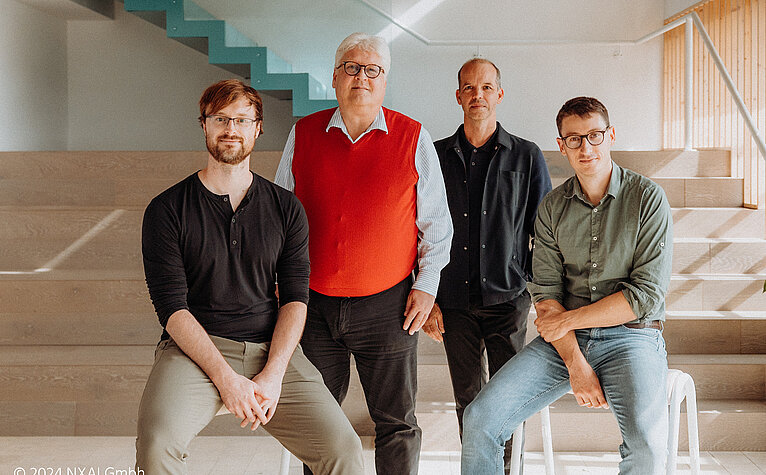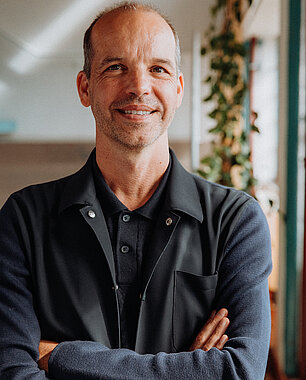 © NXAI GmbH
© NXAI GmbH
- Location advantages
- Innovation and digitalisation
- Research & development
- News
NXAI: Top researchers develop solutions for industry
12. November 2024Research on alternative AI models conducted by Sepp Hochreiter and his team at the JKU in Linz is recognised worldwide. With their company NXAI, founded in 2024, they want to transform basic research into industrial companies and develop products from it. NXAI aims to raise 100 million euros by the beginning of 2025. Thanks to the excellent reputation of JKUI and the AI degree programmes, many talents come to Austria.
To extensively promote cutting-edge European AI research and to develop innovative AI solutions for the international market, AI pioneer Sepp Hochreiter, company builder Netural X and PIERER Digital Holding created the company NXAI GmbH in early 2024.
Sepp Hochreiter laid the foundations back in 1991 when he invented LSTM (Long Short Term Memory) technology. In doing so, he paved the way for AI as we see it today. The technology was the leading method in speech processing and text analysis until 2017 and has been used billions of times in smartphones to date. In 2023, the AI expert achieved another breakthrough with xLSTM.
The first focus is the further development of the new European Large Language Model technology xLSTM. Both the entire technology and the xLSTM algorithm are entirely European developments. The Johannes Kepler University Linz and NXAI have agreed on a research cooperation to help make previous findings relating to xLSTM ready for market.
Questions for NXAI Founder & Chair Albert Ortig:
NXAI set out at the beginning of 2024 to provide an alternative to AI models that are behind ChatGPT & Co. How is this supposed to be possible and how can a newly founded company from Linz compete with Open AI or Google?
We are focusing on industry, which is a niche that many large AI players are unwilling or unable to serve. Modern industrial processes are complex and sometimes difficult. We are talking about grown structures, and that is exactly where it gets interesting for us. Industry is changing and needs industrial-grade AI. On the basis of our fast and efficient xLSTM architecture and our work on AI4Simulation, we want to speed up production processes, optimise products and make the creation of goods more efficient. Industry is looking for developments at the edge, in the machine, in the robot, on the conveyor belt, on the drone, in the train or in the car and wants to reduce engineering time and costs at the same time. Our developments help to achieve both these targets.
What role will years of research by Sepp Hochreiter and his team at the JKU play in the future success of NXAI?
The research conducted by Sepp Hochreiter and Johannes Brandstetter's teams is the basis for NXAI's future success. We transfer basic research to a company and use it to develop products.
In your opinion, what is the general state of university and non-university AI research in Austria?
I would broaden the horizon. In Europe, excellent research is taking place in Tübingen, Helsinki, Amsterdam, Zurich and Linz. However, we are not always sufficiently successful in translating this excellence into products and using this excellence to open up new markets for Europe. Companies hesitate and shy away from investing. We marvel when SpaceX is able to land rockets and have to ask ourselves what innovation actually comes from Europe. The last major pan-European success was Airbus, and that was more than 30 years ago. We do a lot of good research, also on a broad basis via the many universities of applied sciences. I see Industrial AI as an opportunity for Europe. But we've been talking about it for several years now and it sounds like the famous whistling in the woods. We need to get started now.
What advantages does Austria offer as a location for AI companies in particular, also in terms of cooperating with universities and research institutions?
We have many very good researchers in Austria. Hochreiter and Brandstetter certainly stand out because they are among the world leaders in their fields. We are very grateful for the good cooperation with the JKU Linz. But we always have to think internationally. Our team includes researchers from many European countries. AI talents are still rare. We have to train them, but also give them a chance to stay in Europe. It is important to mention that NXAI is just one company. We need many NXAIs in Austria and Europe.
You recently announced that you had found three renowned researchers for NXAI. How do you manage to attract globally sought-after experts to Linz?
The best researchers attract the best employees. It's quite simple.
There is often a lack of sufficient venture capital in Austria and Europe to bring innovations to market maturity. You want to raise around € 100 million in a financing round by the beginning of 2025. What makes you so confident that NXAI will attract such a considerable amount?
My confidence is based on our ability to provide answers to unsolved questions that promise industrial companies a massive competitive advantage. But it remains a big challenge, and we would like to see more risk and a greater investment focus on cutting-edge research and transforming findings into business ideas
Where will NXAI's AI model be used in the future and when can it realistically be ready?
We are already working on solutions with industrial customers in the area of AI4Simulation. We will be releasing the 7B xLSTM model in a few weeks and we are already seeing applications in the automotive industry, robotics and medical technology. We are also pursuing an open source strategy with xLSTM. Many researchers and companies will be trialling xLSTM in the coming months and developing products with it.
Read more about deep tech in AustriaRead more about deep tech in Austria ()
